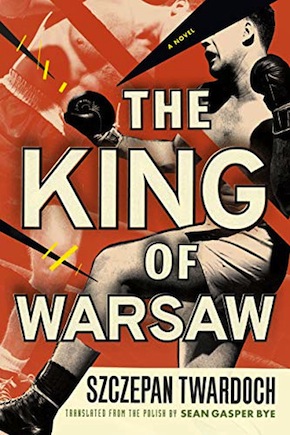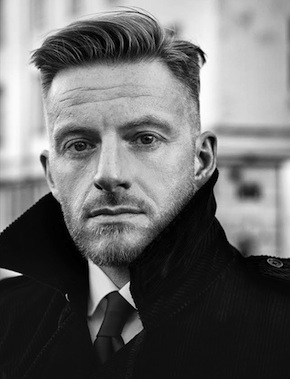All he surveys
by Max Easterman
“One of the most compelling novels to have come out of Poland in recent years.” World Literature Today
The eponymous King of Warsaw in Szczepan Twardoch’s first book to be translated into English is Jakub Szapiro: a champion prize-fighter; a secular Jew, whose exploits in the ring, especially against Aryan opponents, have made him the darling of his community; a devoted family man, who dotes on his two young sons. All this is, we discover, a mask for his double life as an ‘enforcer’ for a faux bonhomous and ruthless mafia-style gangster, a life that, much more than boxing, brings him wealth, power, all the pleasures they offer – and his royal title.
The King of Warsaw is set in Poland of the late 1930s, where socialists and fascists face off in violent street battles, where Hitler forever lurks in the background as both hate-figure and role model. It’s a book of often extraordinary brutality – and often extraordinary beauty of language, superbly translated by Sean Gasper Bye. There is, for example, a touchingly affectionate portrait of daily life as Szapiro makes his way through Kercelak market: he meets and greets everyone from the potato seller and the pigeon fancier with cages full of cooing birds, to “the beggar whose only item for sale was three pairs of women’s stockings, which… he shook as if he thought that might attract someone to give him a złoty.” He is charming and indulgent. But then when he sits down in the local restaurant, his real purpose is revealed as the stall holders come meekly by and pay him their protection money: 20 złotys here, 50 złotys there… business is all.
The narrator of the story is Mojżesz Bernsztajn, the polar opposite of Szapiro, a frum (religious) Jew, who has seen Szapiro murder his father for not having the funds to pay the protection money on his own little shop. It is a scene of horrific violence: “crying and wailing with pain, stripped naked… [he stood] before his executioners on crooked, skinny legs. Szapiro took a large, seven-pound mallet… and swung it into my father’s head, cracking his skull.” And then: “effortlessly hung him from a tree branch… his arms, his peyos (sidelocks), his circumcised penis hanging according to the law of gravity, exactly the opposite of how they’d usually hung… for his whole boring life.” And yet, Bernsztajn cannot help admiring the man for his boxing skills and his hero status; he allows himself to become his protégé, a junior mobster, moves into his flat, sheds his frum way of life, accompanies Szapiro and his thugs as they impose their boss’s version of law and order across Warsaw. But his shifting allegiances have a psychological price: “I often think I was the one who slit his throat… that I am the guilty one. I made them slaughter my father like a beast.”
As the story unfolds, Szapiro himself sometimes takes on the role of narrator, muses on his way of life: “Violence for violence. There’s no other way.” After all, it has brought him the status he would never have otherwise achieved, even as a champion boxer. But Emilia, the mother of his children (they never married) has other ideas: unlike Jakub, she realises that once again the writing is on the wall as the home-grown fascists plot a Polish future that can only mean disaster for the Jews. Urged on by Jakub’s younger brother, she wants to make aliyah, emigrate to Palestine; but Jakub will have none of it. He is “not a Jew”; Warsaw is his fiefdom and he will rule it. As if to prove his point, he thumbs his nose at the state prosecutor, a leading fascist, and has sex with the man’s daughter.
Twardoch does not glorify violence and gangsterism; he shows how, ultimately, they diminish those who make them their way of life – including real-life politicians and military men.”
It becomes evident early on that as Bernsztajn is telling the story, it is with the benefit of his old age as a retired officer of the Israeli Defense Forces, a man who knew Sharon and Dayan, and changed his name to Moshe Inbar. Perhaps there’s a clue here from the Hebrew: inbar – normally a girl’s given name – means ‘amber, yellow’. And Bernsztajn / Inbar is time and again haunted by a vision of a sperm whale – the source, of course, of ambergris, ‘grey amber’ – that hangs over Warsaw as the thugs go about their business, its eyes burning, its huge bulk brushing the tops of buildings, knocking tiles off the roofs. Like most visions, its significance is not clear, is open to interpretation: is it malevolent itself, or a reaction to the malevolence it sees on the ground? Is it a product of guilt, a hallucination, or a bad dream? The questions and contradictions begin to mount in the reader’s mind…
What is clear is that much is not what it seems. Who, in fact, is the narrator? Bernsztajn, Inbar, Szapiro – or all three? How did Bernsztajn become Inbar? Was he just an observer of the violence, or an active perpetrator? Szczepan Twardoch’s Warsaw is, like his protagonist Szapiro, an unstable and problematic mixture of sophistication, mystery and menace. Szapiro’s problem is uncontrollable rages, so he must navigate and control these shifting sands, to achieve some kind of steady state: “The problem was with himself. The problem was the stability and peace he’d worked so hard to build because he was smart and knew anything else would be the end of him.”
The King of Warsaw, then, is more than just a chronicle of violent events, of gangland murders and thuggery. This is the action front-of-house: behind the scenes swirl the ideas, the ideologies, the politics and the personal stories that bring the action into focus, reveal the events for what they really are: the descent of a nation and its communities into brawling and blind confusion, born of arrogance, corruption and the assumption that power guarantees success. Twardoch does not glorify violence and gangsterism; he shows how, ultimately, they diminish those who make them their way of life – including the real-life politicians and military men who mingle with the fictional people in these pages. It is a book in which every word counts and every action has unforeseen results. It is not an easy read, not in any way an escapist thriller, in spite of the final twist in the story. In these uneasy times for European politics, West as well as East, it is much more: an object lesson and a warning.
 Szczepan Twardoch was born in Żernica, Poland in 1979, and is a writer, columnist and the author of four bestselling novels and four short story collections. He lives in Pilchowice, Upper Silesia. He is the recipient of numerous honours for his work, including the Brücke Berlin Preis, Le Prix du Livre Européen and the Nike Literary Award for Audience Choice. Rights to his novels have been sold in over a dozen countries. The King of Warsaw, translated by Sean Gasper Bye, is published by Amazon Crossing.
Szczepan Twardoch was born in Żernica, Poland in 1979, and is a writer, columnist and the author of four bestselling novels and four short story collections. He lives in Pilchowice, Upper Silesia. He is the recipient of numerous honours for his work, including the Brücke Berlin Preis, Le Prix du Livre Européen and the Nike Literary Award for Audience Choice. Rights to his novels have been sold in over a dozen countries. The King of Warsaw, translated by Sean Gasper Bye, is published by Amazon Crossing.
Read more
szczepantwardoch.pl
@AmazonPub
Author portrait © Zuza Krajewska
Sean Gasper Bye is a translator of Polish literature, including books by Lidia Ostałowska, Filip Springer and Małgorzata Szejnert. A native of Bucks County, Pennsylvania, he studied modern languages at University College London and international studies at SOAS. He is a winner of the Asymptote Close Approximations Prize, a recipient of a National Endowment for the Arts translation fellowship, and a member of the Cedilla & Co collective of literary translators.
cedilla.company
@sgbye
Max Easterman is an award-winning journalist and teacher with extensive experience of broadcast, print, media and journalism training in Britain and round the world. He has presented and produced flagship programmes for BBC Radio including The World Tonight, File on 4 and Newshour, and created groundbreaking radio, multimedia and journalism projects in schools and colleges. He is the business adminstrator and a regular crime reviewer for the European Literature Network.
eurolitnetwork.com
@eurolitnet

